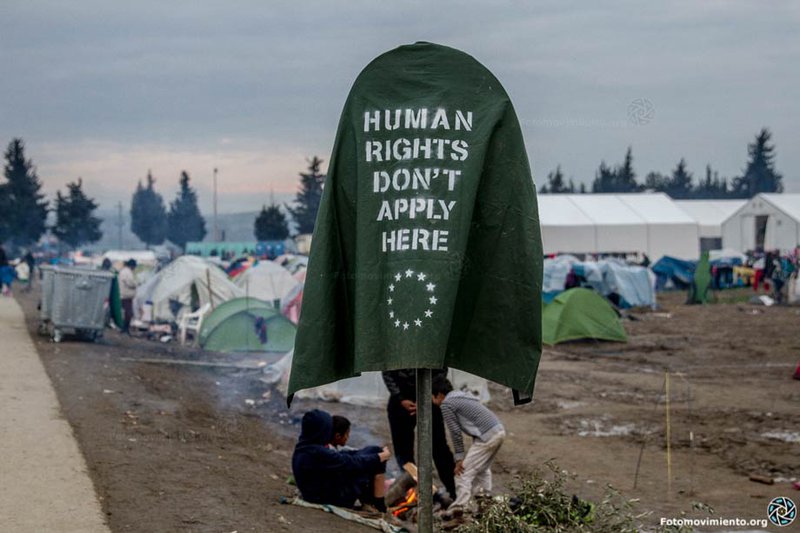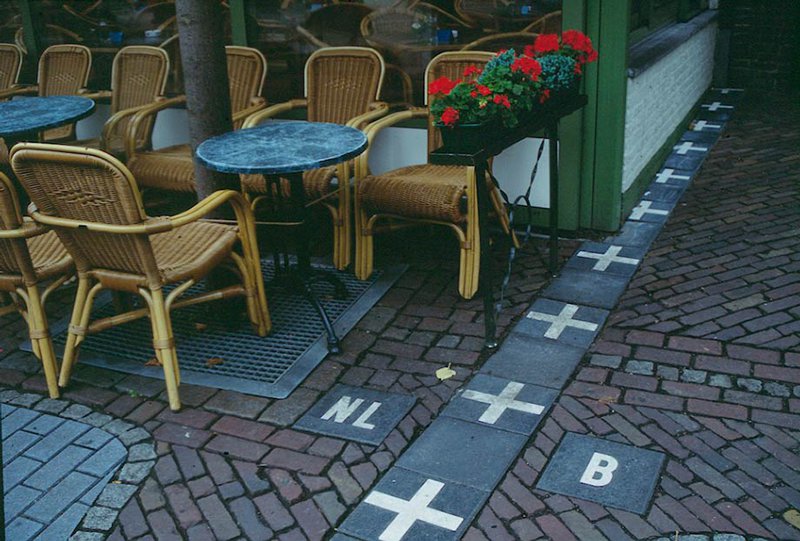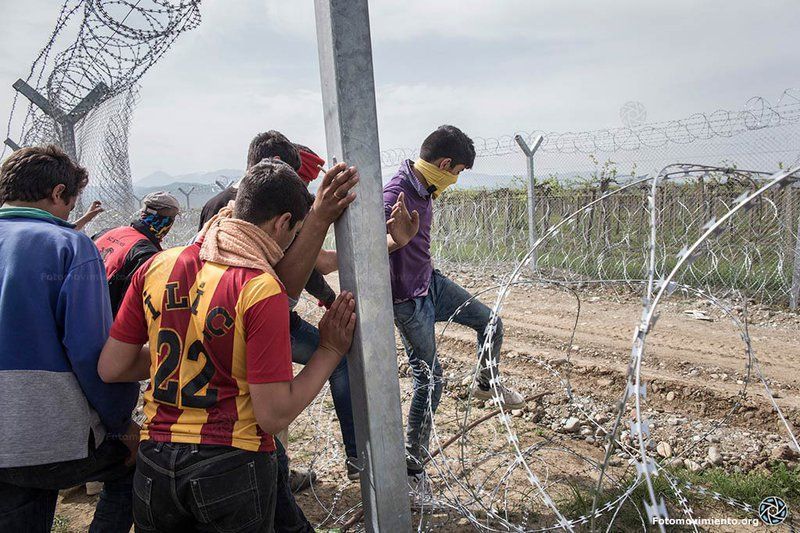A call to rethink the language of migration in order to recognise the humans at the heart of migration debates.
Rarely a day goes by when migration is not in the news. All around us, the topic of migration surfaces. The language of migration abounds. At the same time, the problem of migration, of how to apprehend this mounting issue, is rapidly mounting too. Are migrants illegal, irregular, undocumented or simply without papers? How do we determine who is a migrant and who is a refugee? Are these discrete categories of the displaced or do they, at times, bleed into one another? And how do these categories and terms relate to questions of rights, recognition and citizenship? Finally, through what conceptual tools and language can the normative structures of nations and borders apprehend the fluidity and the contingencies of human mobility?
As migration climbs ever higher on the global agenda the language we use – how we describe human movement – becomes ever more important. More to the point, it is vital that we reflect upon language if we are to reposition migration, not as an exceptional event, not as a crisis, but as a central phenomenon of the contemporary age. This understanding is vital if the question of human rights is to be accorded its due place as an absolute priority in the treatment of migration.
This is the direction in which the United Nations, across agencies, is working in terms of formulating policies on migration. At the base level, this effort requires some serious reconsideration of the discourse around migration. Human mobility must be factored into how states pursue development and, in order to do so, the means by which we think and write on migration begs revision. Many questions remain to be asked. Why should those of us working to highlight the centrality of migration to the global development agenda understand that language matters and language can make a difference? Why is the language of migration so strongly governed by the normalising forces of nation, borders and sovereignty? Why is the language of migration so clearly positioned in terms of fear, irregularity, abnormality, marginality, and even criminality? Why do the associated metaphors stem from war and natural disaster – invasions, waves, onslaughts, floods – to suggest overwhelming, uncontrollable events that defy regulation? Why do they not, instead, confront and call out the failure of humane governance? In short, why do we allow the phenomenon of mobility, which has accompanied humanity since the beginning of our existence on this planet, to be rendered abnormal?
Language is power

My premise here is that language translates into power, because, depending on how it is used, it can both open up new perspectives on the realities of migration and also occlude these. At stake are the ideological tenets that frame the discourses that we work with and produce. These translate, in turn, into the means we rely on for apprehending migration. Over and again in discussions of migration and human mobility, we find examples of an overwhelming reliance on data-driven quantitative analysis that does not critically challenge the premises, gaps or shortcomings of such data collection; on the economic and political priorities of the nation as measures for advocating mobility or not; and on thinking of mobility in terms of development strategies that foreground the empowerment or material enrichment of the nation, rather than human priorities.
It is vital that we reflect upon language if we are to reposition migration as a central phenomenon of the contemporary age.
The unspeakability of many fundamental aspects of contemporary migration was graphically rendered public in late November 2015 when a group of Iranian migrants, trapped on the border of Greece and Macedonia, stitched their lips together in protest. The public sealing of their lips acted as a metaphor for the speechlessness of their condition, forcing them at once into pain, silence and fasting, metaphoric of the fact that to be voiceless in the public realm was akin to a negation of existence itself.
The gesture was extreme and dramatic. It did little to alter border policies, but the painful images were oddly eloquent in shedding light on the great divide that separates the normative might of European nations, most manifest via border practices that obstruct human passage, from human suffering, need, desire and pain. The sealed lips mirror the sealed borders that confront these people, revealing the glaring absence of a dialogic encounter between states and politicians, on the one hand, and migrants, on the other. In highlighting the problem of language in relation to migration, perhaps what we should most importantly attend to is this gaping, and ultimately deadly, breach.
Yet, precisely due to images such as these, 2015 will be remembered as the year when migration escalated in the global imaginary, occupying centre space in media platforms, daily lives and politicians’ agendas. Interestingly, this heightened focus on migration has not so much been due to the increasing numbers of displaced persons or the even to the troubling factors that provoke such migration, but because this migration impacts very directly on Europe. At stake is the very idea of Europe, its sovereignty, its economy and its cultural definition. Europe matters because it has a global standing, a set of values, privileges, and safeguards. These set Europe apart, most significantly, from the three continents that its borders touch.
Furthermore, as the seat of long imperial histories, Europe’s position and the question of its rights go largely unchallenged. Issues of western hegemony and of safeguarding the privileges of being European therefore become a matter of priority, because, many politicians believe, the European way of life is under threat. To quote Manuel Valls, the French prime minister, unless urgent action is taken to control the external borders of Europe, “our societies will be totally destabilised”. His words, spoken at the economic forum in Davos, denote both dread and fear. Concomitantly, the language used to debate migration has come under widespread scrutiny, in part due to the adverse reactions of politicians, such as the UK’s David Cameron, who likened migrants entering Europe to swarms, associating them with infestation and insects.
The refugee does not disturb the normative idea of the nation as ‘homeland’ and only enhances the latter.
Without going to such extremes, the general public (and many academics) think and talk of migration in terms of stocks and flows, and in terms of waves, onslaughts, and crises. At the very base of such discourses is an implicit and unquestioned notion of self and other, a binary held in place by fear and an unquestioning acceptance of economic and political borders. This is a trend that disregards the fact that, throughout the modern period, Europe has been shaped by many types of migration, be they colonial ventures, postcolonial migration, displacement, postwar relocation, influxes of refugees, the exodus to the Americas and elsewhere, and, more recently, circular migration. At the heart of much state-level discourse on migration is a hard core of selective forgetting and a firm adherence to the abiding and apparently immutable questions of nation, sovereignty, and power.
In recent months, this has been most clearly revealed by the tendency amongst many of those working for migrants’ rights to refer, with the best of intentions, to all migrants as ‘refugees’ – presumably because the refugee is seen as in need of refuge, whilst the migrant is simply that: migratory, and hence unsettling. As such, the refugee does not disturb the normative idea of the nation as ‘homeland’ and only enhances the latter. This attempt to make migration acceptable might be well-intentioned, but it does little to redefine and render more nuanced the language of migration. Clearly, in and amongst the cacophony of debates on migration is the question of how to talk about it, the difficulty of finding a vocabulary that is dialogic, just and transparent. In considering the language used in the context of migration, that which remains unsaid is often as noteworthy as that which is said. The silences of language, the points where language falls short, the euphemisms and the metaphors, all of these reveal attitudes, prejudices and political priorities. Also of relevance are the ways in which other media, such as visual documentary of migrant realities, counter or force a questioning of mainstream discursive representation.
In pursuit of new paths at the UN


The UN secretary general, in recent pronouncements as well as the 2014 report The Road to Dignity by 2030, has squarely placed the emphasis on human rights, inclusivity and safety in his discussions of migration. This commitment to the human rights of migrants as an absolute priority has also been made clear by the focus areas being proposed for the World Humanitarian Summit to be held in Istanbul in May 2016 and for the High Level Dialogue on Migration being planned for September 2016.
The language of migration is clearly shifting at the UN level. Once articulated most frequently in terms of the economic benefits of migration for either the sending or receiving country, now the question of human rights is paramount. Achieving these rights – by lobbying for legal channels of transit; by increasing humanitarian and medical care for those en route; by ensuring legal representation for all migrants regardless of status; and by seeking out modes of inclusivity for migrants in places of relocation – is the order of the day. The public realm is furthermore awash with flagrant examples of the violation of these rights: from the confiscation of valuables from migrants in Denmark; to the identification of asylum seekers in England through the colour of their front doors; to the attacks the Idomeni (Greece) border camp by Macedonian soldiers. The challenges and shortcomings are many, but it seems the issues are more visible today than ever before.
As the obsessive focus on migration at every countdown to a national election reveals, the border marks the supposed immutability of the nation-state.
Clearly, a new vision for migration is coming into shape and we, here at the United Nations University, have the privilege of being able to usefully contribute to this. As academics, we have the privilege and the responsibility of knowledge production. As members of a UN agency, we have access to fields of policy that few others have. The space for reconsidering and reshaping the language of migration is expanding, and with it the potential to develop new perspectives, debates, and understandings that translate into policy. Our challenge is to shape a conceptual prototype for thinking beyond and outside the established frame.
Walls and razor fences do not contain as much as they destroy.
We cannot ignore the resurgence of the margin, or the border. As the obsessive focus on migration at every countdown to a national election reveals, the border marks the supposed immutability of the nation-state. This notion, a throwback to tradition that carries with it all the mythologies that accompany narratives of the nation – the most important one being the idea that the ‘national community’ is somehow carved in stone – begs questioning.
In particular, it is worth noting that a tragic correlation exists between closed borders and the seemingly unstoppable flow of humanity that struggles to penetrate the continent. As long as the migrant is viewed as the exception to the norm, as counter to the forces of normalisation and sovereignty, this dynamic of violence, illegality and inhumaneness will continue. Indeed, the ongoing lack of collaboration between European states threatens to create yet more walls, ones that may well curtail the freedoms of European citizens and, in doing so, dismantle the very idea of Europe as a space of free circulation.
Walls and razor fences do not contain as much as they destroy. The wall or the border plays many roles: it is not solely a line of obstruction and selective passage. It is also the space of detention and the production of illegality for those who seek to cross it. In reality, this translates into a direct relation between border policies and the deadly proliferation of the market for smugglers and traffickers. The sealing of the border acts as a metaphor for the political refusal to accept that human mobility is an undeniable, and unstoppable, feature of our times. It is symptomatic of the upheavals and displacements of our age, themselves the result of global inequalities, conflict, poor inter-state dialogue, and ill-thought modes of governance.
Prioritising the human
For development to work in favour of humanity and in favour of the planet, the priority of the human and a sense of responsibility towards the human are absolute conditions. The great African writer Chinua Achebe once famously stated that “when suffering knocks at your door and you say there is no seat for him, he tells you not to worry because he has brought his own stool”. I refer to Chinua Achebe, because, as John Wigmore, Benjamin Cardozo and others have noted, a curious and very creative connection exists between literature and law, with the former often portending the redesign of law through a portrait of its failures in the present.
By providing a panoramic overview of society, the great writers of social realism have often opened insights into how laws could improve the lot of those they seek to govern. The widespread suffering of migrants in so many places – in Libya, where they are held for ransom by militias; in unsafe waters across the world; in Asia, around the Caribbean, in the long and risky northward routes of the Americas and Africa – and the sheer unaccountability for those who die along the way highlight the urgency of recognising the world’s migration frameworks as one of the glaring failures of development.
We could do far worse than look to literature or to the arts for knowing why. Achebe’s novel Things Fall Apart (1958) superbly explores the ways in which modernity, colonisation and the unstoppable influence of the west wrought upheaval on traditional ways of life in his native Nigeria. These forces led to death, destruction, displacement and the irretrievable loss of the world as it was once known, yet nevertheless fomented an impossible hankering for the ever-elusive ‘west’. In doing so, his novel offers a very useful frame for reflecting on the centrality of exile, migration, asylum and refuge to the modern way of life.
To relegate migration to the language of exceptionality or ab-normality is to turn a blind eye to the political, economic and cultural consequences of modernity and development as has been practised thus far. The migrant, the refugee, and the forcibly displaced person form the archetypal figures of our contemporary world. Those of us working on migration have the obligation, then, to put our energies into redirecting the course of development in human terms, to struggle to reshape and reposition the language, the concepts, the terminology and the possibilities for human mobility.

